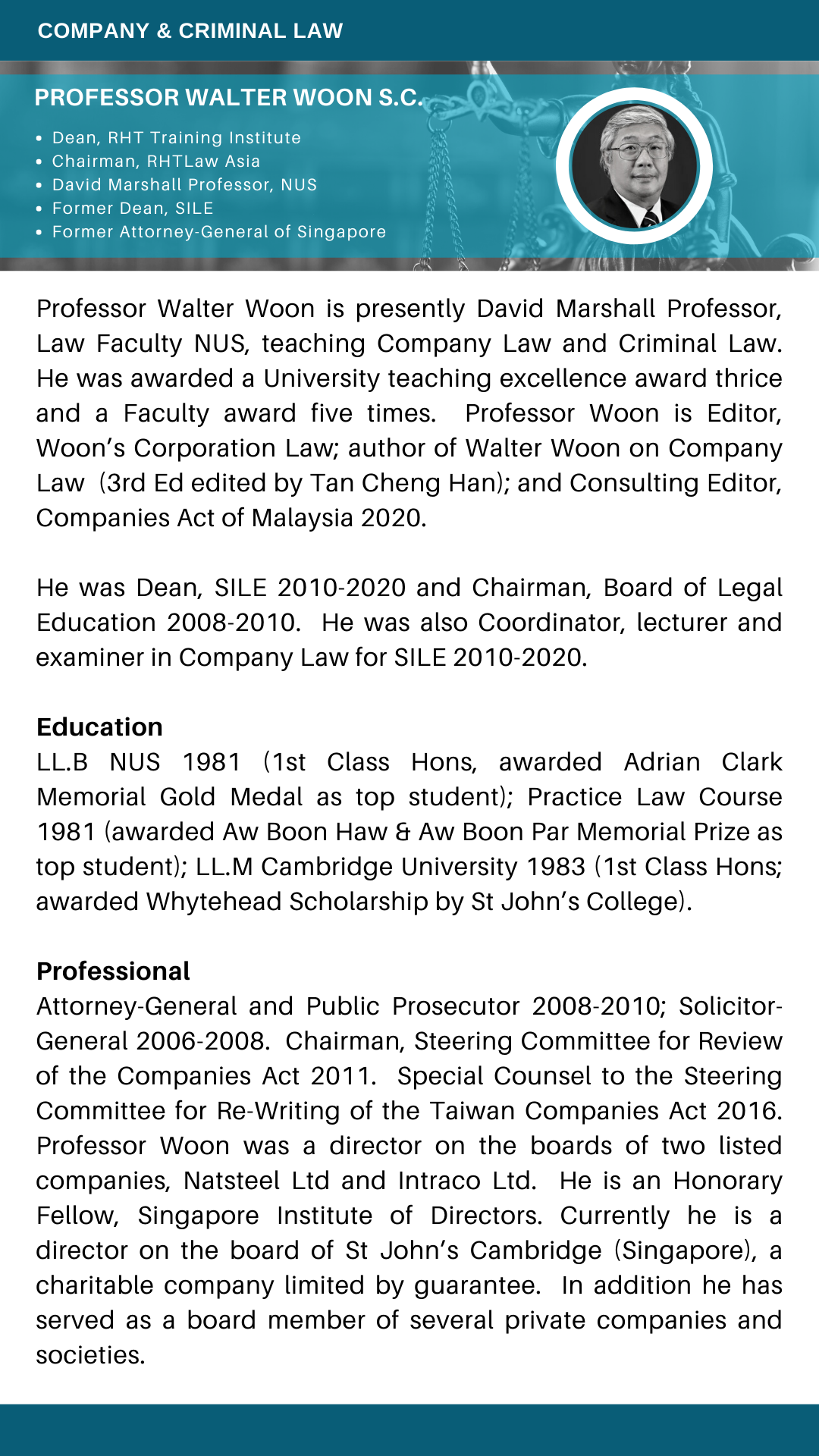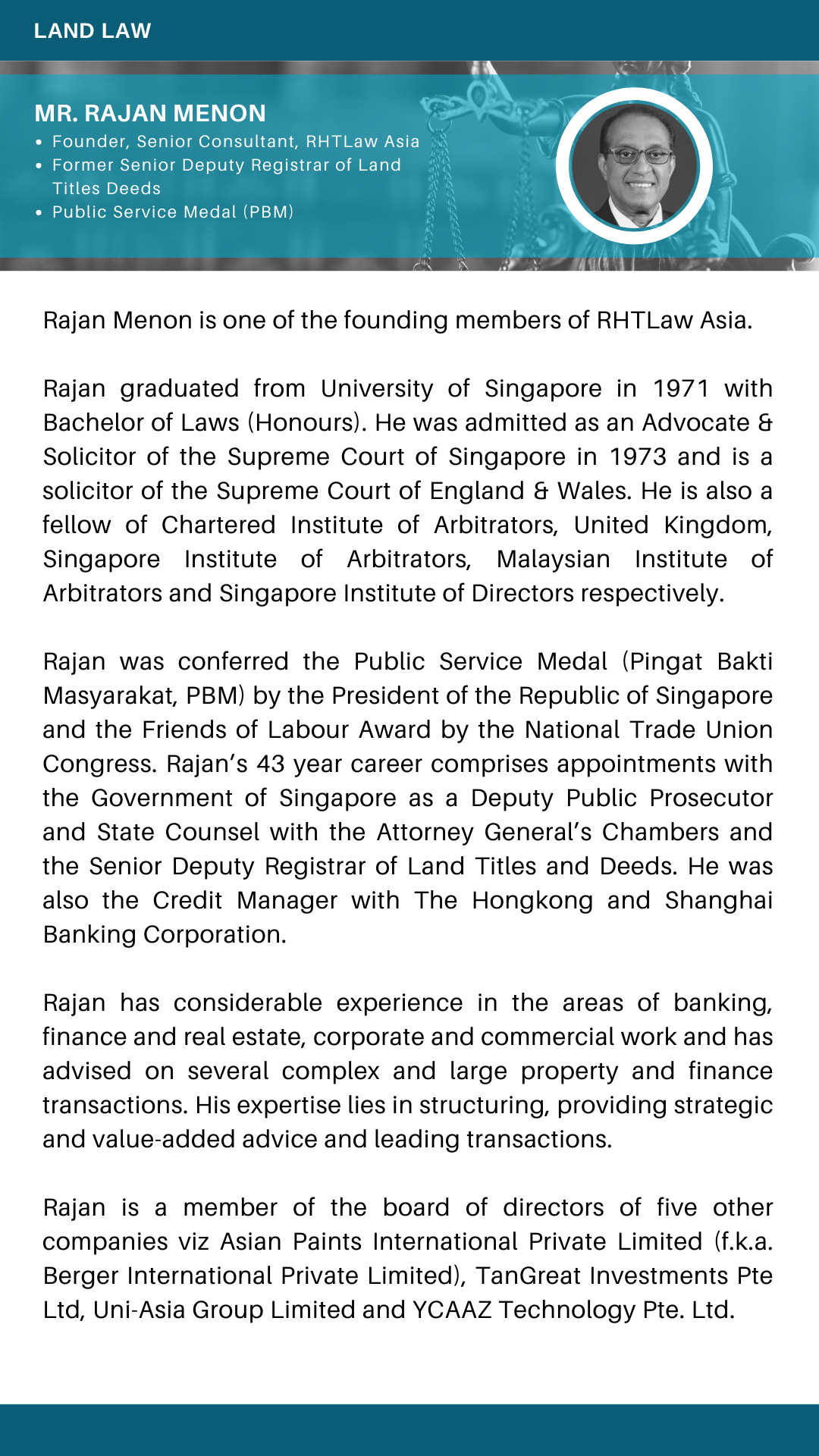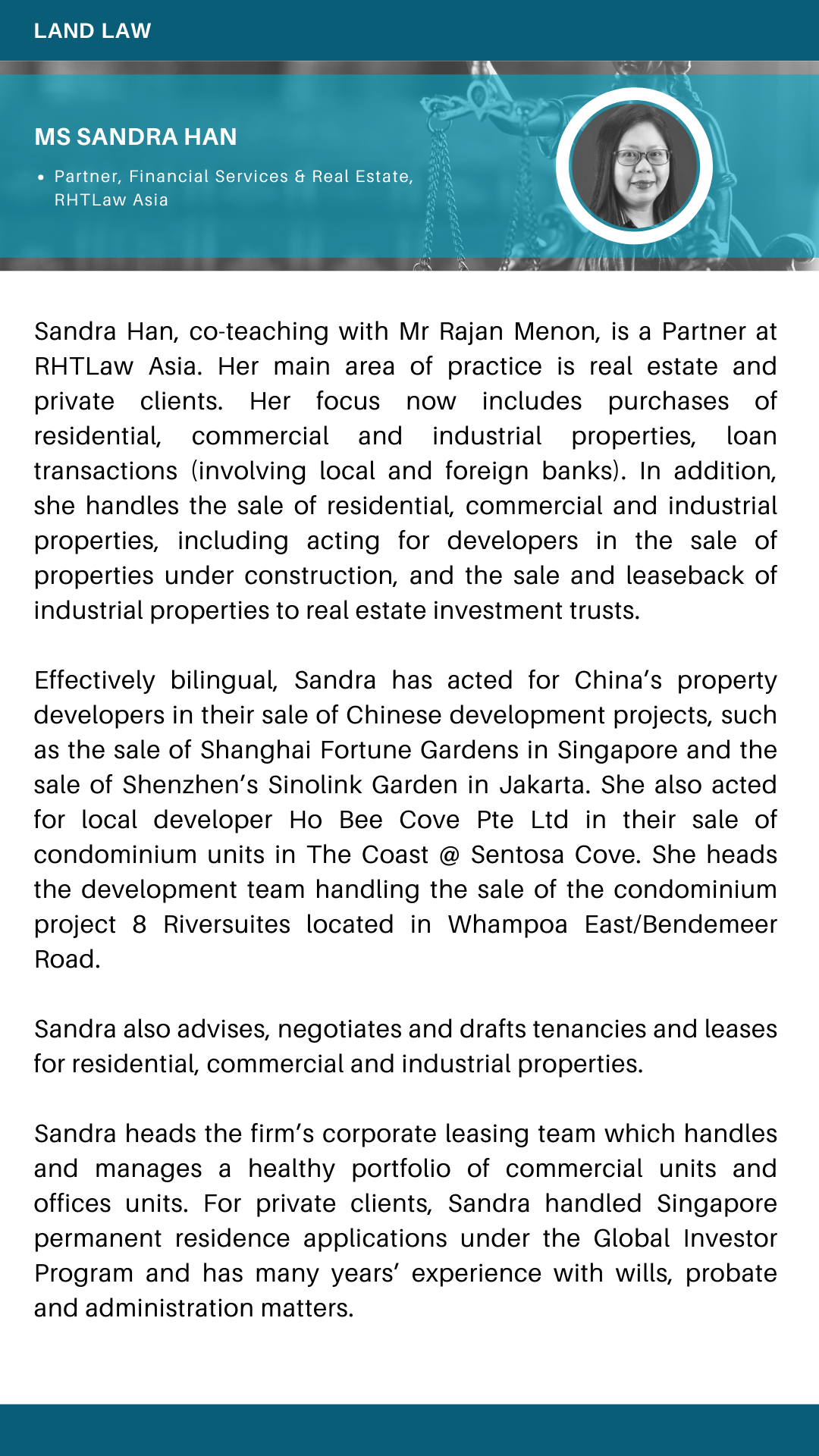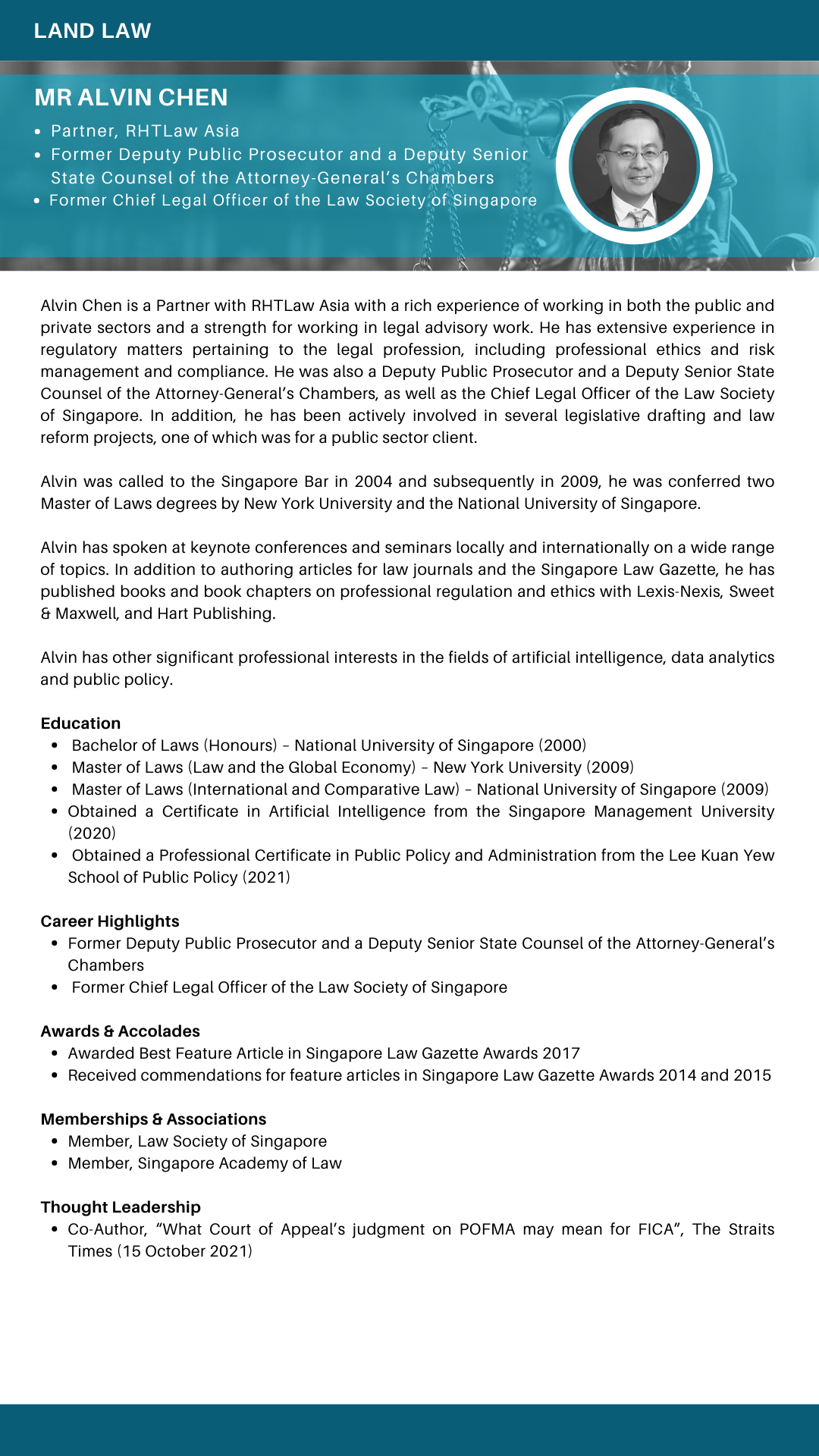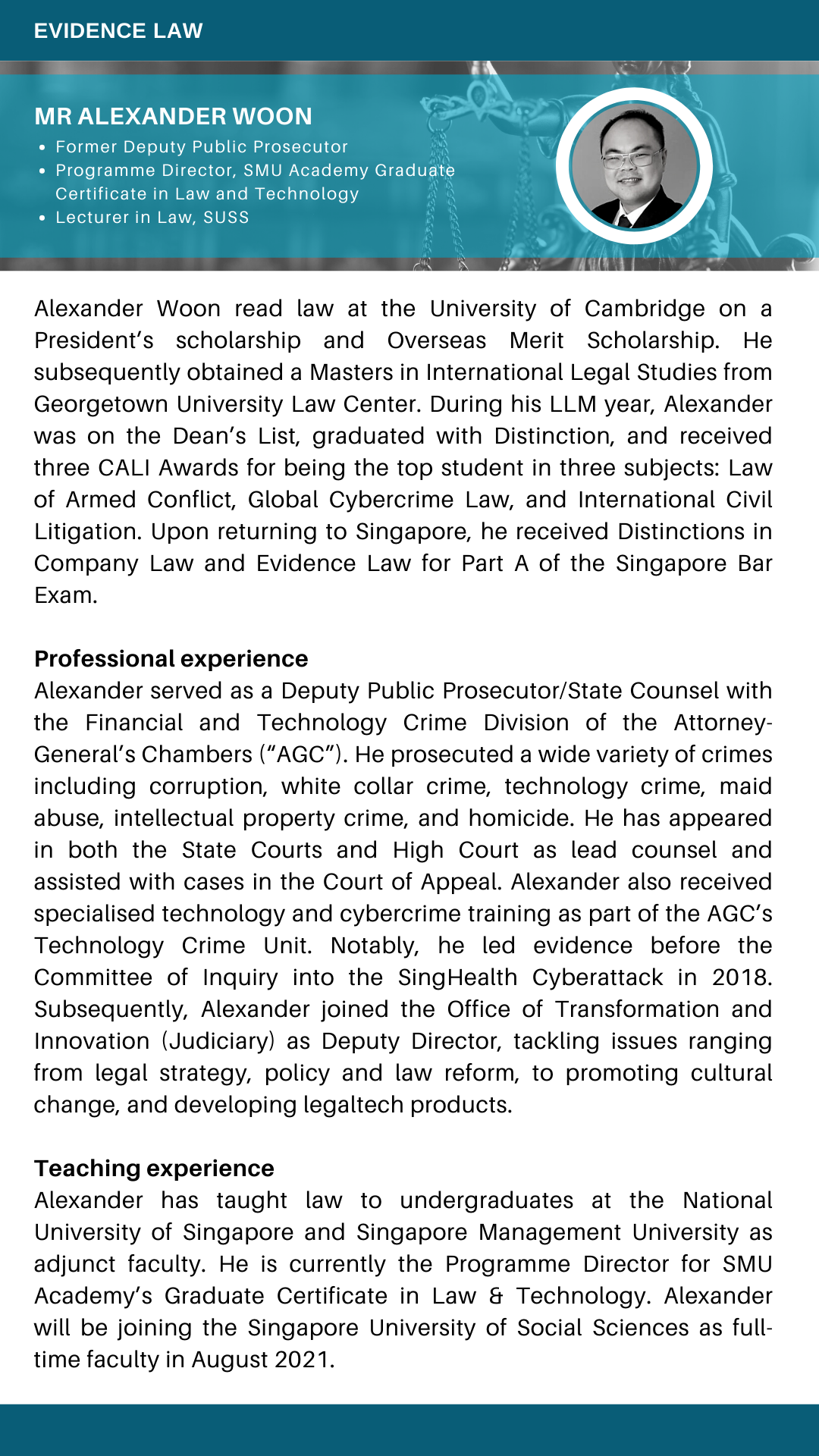Overview
The Part A Bar Course is designed to familiarize graduates of Overseas Scheduled Universities with Singapore law so that they can confidently sit for the examination and practise in Singapore.
There will be eight three-hour sessions for each of the five subjects, viz, Company Law, Criminal Law, Land Law, Evidence Law and Singapore Legal System. Classes will be held online from 5pm Singapore time. This will allow candidates to attend after work or even while abroad.
Candidates will be taught not only the principles of the law but also how the law applies in practice.
Course Content
Company law is the foundation of commercial law. It is not a subject that can be taught purely as a theoretical discipline. In this Company Law module participants will be familiarized not only with the basic principles of the law but also with how these principles are applied in business and legal practice.
Company Law has been the subject with the most failures in the Part A exam. In order to prepare candidates Professor Woon will mark and provide pointers on a practice exam question during the course.
Singapore’s criminal law is codified and is principally contained in the Penal Code which was enacted in 1870. It has its roots in both the Indian Penal Code and the English Criminal Law. However, with the passing of time, criminal law in Singapore has developed and adapted to reflect the need for crime control and punishment in the local context. In this Criminal Law module, participants will be introduced to Singapore’s criminal justice system. The focus will be not only on specific offences but also on the general principles and approaches to the practice of criminal law.
Criminal Law has been the subject with the second highest number of failures in the Part A exam. In order to prepare candidates Professor Woon will mark and provide pointers on a practice exam question during the course
While the Singapore legal system was derived from the English system, many of its institutions rules and practices have changed. This module is designed to walk participants through the legal history of Singapore, its sources of law, the various legal institutions and the legal profession in the country, before delving into specific topics that may be unique to Singapore. These topics include administrative law, constitutional law, commercial law (in relation to laws on contract, tort and equity). This module will explore how Singapore’s legal system is shaped and will also discuss how Singapore law has departed from its English origins in both application and development. Broken into three parts, this module will expose participants to the origins of Singapore’s legal system, discuss the autochthonous aspects of Singapore law as well as the future of the Singapore legal landscape.
In this module, candidates will undertake a comprehensive review of the theory and practice of Singapore land law. At the very centre of this module is a study of the conceptual and practical operation of the Land Titles Act.
This course will not only cover the legal rules pertaining to today’s real estate practice but will also discuss selected legal issues in relation to the Housing and Development Act and Land Titles Strata Act.
This module is particularly useful for participants seeking to understand the ins and outs of the regulatory framework surrounding land ownership and tenancy in Singapore, with special emphasis placed on the sale of land, co-ownership, leases and licenses, mortgages, strata sales, and housing and development board flats.
This Evidence Law module offers a thorough theoretical and practical understanding of evidence law in Singapore. With close examination of the Evidence Act and the constantly evolving case law pertaining to the rules on evidence, participants will build a foundational knowledge on how evidence is admitted or restricted in the Singapore courts.
Through this module, candidates will also learn about the statutory framework and concepts underlying the law of evidence such as the doctrine of relevancy and the concepts of burden and standards of proof. Participants will also consider the admissibility of character evidence, hearsay evidence, opinion evidence, and statements from accused person (particularly in the form of confessions and/or admissions). This module will also delve into discussion on litigation privilege, the right of silence and privilege against self-incrimination, as well as the grounds for the exclusion of evidence.
Company law is the foundation of commercial law. It is not a subject that can be taught purely as a theoretical discipline. In this Company Law module participants will be familiarized not only with the basic principles of the law but also with how these principles are applied in business and legal practice.
While the Singapore legal system was derived from the English system, many of its institutions rules and practices have changed. This module is designed to walk participants through the legal history of Singapore, its sources of law, the various legal institutions and the legal profession in the country, before delving into specific topics that may be unique to Singapore. These topics include administrative law, constitutional law, commercial law (in relation to laws on contract, tort and equity). This module will explore how Singapore’s legal system is shaped and will also discuss how Singapore law has departed from its English origins in both application and development. Broken into three parts, this module will expose participants to the origins of Singapore’s legal system, discuss the autochthonous aspects of Singapore law as well as the future of the Singapore legal landscape.
In this module, candidates will undertake a comprehensive review of the theory and practice of Singapore land law. At the very centre of this module is a study of the conceptual and practical operation of the Land Titles Act.
This course will not only cover the legal rules pertaining to today’s real estate practice but will also discuss selected legal issues in relation to the Housing and Development Act and Land Titles Strata Act.
This module is particularly useful for participants seeking to understand the ins and outs of the regulatory framework surrounding land ownership and tenancy in Singapore, with special emphasis placed on the sale of land, co-ownership, leases and licenses, mortgages, strata sales, and housing and development board flats.
This Evidence Law module offers a thorough theoretical and practical understanding of evidence law in Singapore. With close examination of the Evidence Act and the constantly evolving case law pertaining to the rules on evidence, participants will build a foundational knowledge on how evidence is admitted or restricted in the Singapore courts.
Through this module, candidates will also learn about the statutory framework and concepts underlying the law of evidence such as the doctrine of relevancy and the concepts of burden and standards of proof. Participants will also consider the admissibility of character evidence, hearsay evidence, opinion evidence, and statements from accused person (particularly in the form of confessions and/or admissions). This module will also delve into discussion on litigation privilege, the right of silence and privilege against self-incrimination, as well as the grounds for the exclusion of evidence.
Duration and Delivery Method
The Part A Bar Exam Course will commence on 2 August 2021, and last for 8 weeks. There will be one three-hour session per day, each session covering one of the five prescribed subjects (15 hours a week).
Course Fee
First-time taker of the Part A Bar Exam
● Fees for entire programme (all five Part A subjects): S$3,000
Re-taker of the Part A Bar Exam
| 3 subjects | S$2,400 |
| 2 subjects | S$1,800 |
| 1 subjects | S$1,200 |
Last updated on 18 Nov 2021

